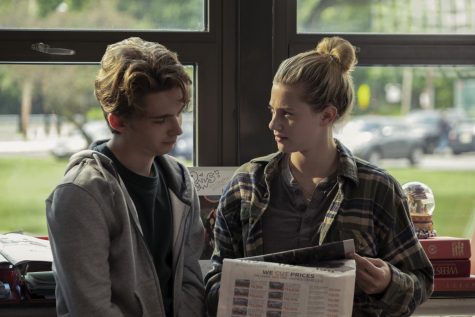Review: ‘Chemical Hearts’ yields a negative reaction
August 27, 2020

As a young adult, I am well acquainted with how difficult navigating one’s teenage years can be—like not wanting to be placed at the children’s table for Thanksgiving dinner, but then stuck sitting across from the wine-drunk adults, unable to enjoy a glorious sip of Sauvignon Blanc.
This is why when I find a coming-of-age film, I look for moments I relate to so I can say, “Finally, someone understands what it is like to be a teenager.” Unfortunately, “Chemical Hearts” was not that film.
Based on the book “Our Chemical Hearts” by Krystal Sutherland, the film follows the quasi-romance between high schooler Henry Page, played by Austin Abrams, and Grace Town, played by Lili Reinhart, as they work together on their high school newspaper as co-editors-in-chief and fall deeper into a love affair.
Page, a simple, good-hearted and sheltered character juxtaposes Town, who is edgy, yet introverted with a painful past and is initially uninterested in Page’s affection.
The two are a weird pairing romantically, but their opposite personalities set the mood for the perfect, stereotypical teenage melodrama trying hard not to fit that mold.
“You are never more alive than when you’re a teenager,” Page says at the beginning of the movie—the first of the many maxims yet to come. Much of the “profound” dialogue between Page and Town screamed “The Fault in Our Stars” but with an emo twist.
Quotes like, “Adults are just scarred kids who are lucky enough to make it out of limbo alive” and “Scars are not reminders of what’s been broken, but rather of what’s been created,” had me struggling not to groan out, “Yes, we get it! Some infinities are bigger than other infinities.”
Perhaps one of the first hard lessons of young love is that love alone cannot make the feeling mutual. So while my heart ached for Page as he continuously pined for Town like a sad puppy, the chemical reaction to his heartbreak, such as the decrease of hormones dopamine and oxytocin, was fully expected and unsurprising—as explained scientifically by his sister’s doctor-like pep talks.
He tries to play the hero and heal Town of her past—like one of his many kintsukuroi vases—but he quickly learns people cannot compare to broken pottery fixed with gold lacquer.
There is something fresh about Reinhart’s character Town—she is edgy, but not the cliché, Dr. Martens-wearing, Arctic Monkey-listening, “leave me alone” type of girl. She genuinely wants to be left alone.

“I really appreciated the fact that I could play the romantic lead as a woman in something that I wasn’t playing the stereotypical appealing, cute, funny, charming girl,” Reinhart said in an interview with the Chronicle. “The fact that she’s none of those things and yet attracts Henry is so interesting to me and beautiful.”
Because the story is told through Page’s perspective, Town’s murky past is suffocated by a focus on Page’s desire to make her love him. The audience is left with over-the-top and obscure plot points that could have been left out to give Reinhart’s character a chance to show how one handles a traumatic event as a young person.
Reinhart’s portrayal of Town accepting her traumatization fights the archetype often put onto “broken” characters such as finding the strength to save the protagonist from themselves.
“There is the whole manic-pixie-dream-girl kind of trope in movies a lot and I do think that exists a little bit here, but I think in a way, that just kind of seems to be natural,” Abrams said in an interview with the Chronicle. “We tried to do it as honestly as possible.”
But for me, the only honest and realistic depiction of “teenage limbo” from the movie came while cringing at each hormonal roller coaster scene.
Now streaming on Amazon Prime Video. Watch the trailer here.







